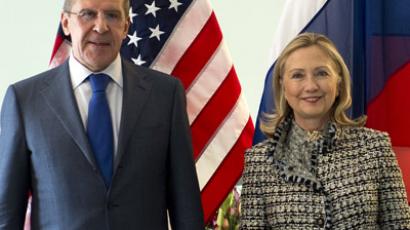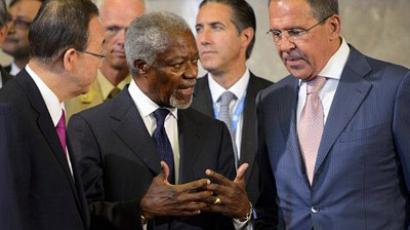Arms flow fuels Syrian ‘internal conflict’ - UN rights chief
The situation in Syria should be called a “non-international internal armed conflict,” insists UN human rights chief, Navi Pillay. She also said that the flow of arms to both sides of the conflict is adding fuel to the fire.
Any further militarization of the conflict must be avoided at all costs, Pillay told the UN Security Council on Monday. “Any solution to the conflict must adequately address the root cause of the conflict, namely the human rights grievances."She used the expression “internal armed conflict” to describe the civil war in Syria in legal terms, adding that both sides of the conflict have been involved in attacking civilians. However, Pillay added that there was evidence pointing to “the greater responsibility of the government” for the violence.Pillay also stated there were reports that anti-government forces had been using children on the ground as human shields and that she is ready to send her staff to investigate the claims if the Syrian government would grant them access.While the future of the UN observer mission in Syria, which was suspended last month, remains unclear, Pillay says that its presence on the ground is vital.Pillay was speaking after briefing the Security Council on Monday following the Geneva conference on Saturday, which was attended by Security Council members as well as European and Middle Eastern leaders.The plan urges the sides in the Syrian conflict to form a transitional government consisting of the current authorities and opposition leaders on the basis of "mutual consent." UN-Arab League envoy Kofi Annan called on the Syrian regime and opposition groups to re-commit to a ceasefire.
Meanwhile, the armed wing of the opposition, the Free Syrian Army, has stated that it refuses any transition plan which does not include “buffer-zones protected by the international community, humanitarian corridors, an air embargo and the arming of rebel fighters.”The Syrian internal armed conflict lies in the middle of an international struggle, Dr. Jamal Wakim, a political analyst and professor at the Lebanese International University, told RT.“The United States’ agenda is trying to establish a coalition of Islamic states, starting with Turkey, Saudi Arabia, and now with the rise of Islamists to power in Egypt, they want to form a triangle of Sunni Islamic states that could face what they consider as Iranian expansionism,” he said. “Assad did not want to sever his ties with Iran as was requested by the Americans and that is why we are seeing this mounting opposition to him, this armed rebellion that is supported, financed and armed by Turkey, Saudi Arabia and Qatar.”
If the goal is indeed to de-escalate the violence in Syria, the first problem that should be taken care of is those states which are supporting the violence on the ground, Sharmine Narwani, an analyst on the Middle East at Oxford University, told RT.“It is unfortunate that Iran and Saudi Arabia were not included in the Geneva talks,” she said. “Saudi Arabia is a major supporter of arming and supporting the militias inside Syria. This process and the rhetoric behind it, which come largely from the West, have to be unraveled before moving forward.”














